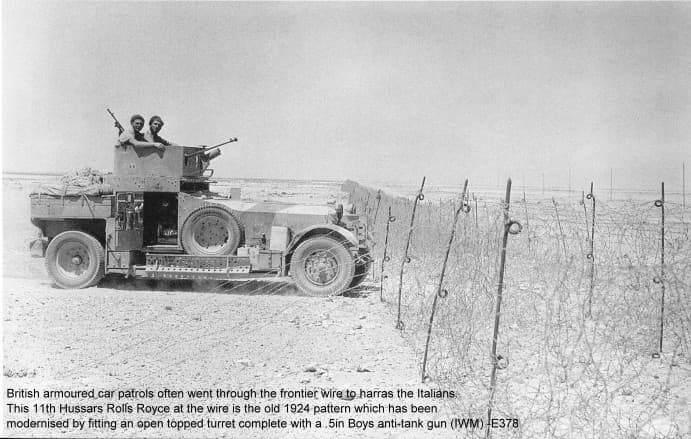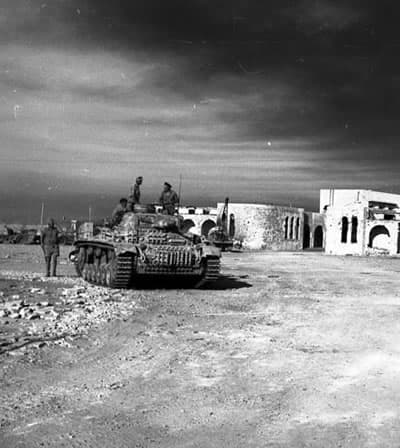Escape from Tobruk
A soldier’s tale
The following account is taken from a transcript of a diary presented to the Highlanders Museum by the son of Private Frank Jarvis. He wrote this during an arduous trek across the deserts of Libya and Egypt during June and July 1942 where midday temperatures would have been over 40°C, with very little natural cover and even less fresh water. Not surprisingly the diary notes are brief and in places hard to read so some of the details are missing. Unfortunately, only the first names of the Cameron men who accompanied Frank are given and so we have no way of knowing who they were.
Some of the place names mentioned in his account are unidentifiable on most maps of the Western Desert but this one from the Desert Rats organisattion gives a good overview of the places between Tobruk and El Alamein, many of which feature in Private Jarvis’ account.
The first Private Jarvis’ platoon knew about the German advance on Tobruk was when heavy shelling and dive bomber attacks started at daybreak on 20th June 1942, but he didn’t realise how close they were until a German officer appeared on the other side of the protective minefield to tell them to come out with their hand’s up. Anti-tank gun fire directed at the Cameron position persuaded ten men to surrender but instead Frank took two of his wounded colleagues back to the Regimental Aid Post.
The 21st was relatively quiet so after an uneventful three hours sentry duty, he was surprised to be informed that Tobruk had fallen and the battalion would march in to surrender at 05:00 hrs the following day, but those that wished could make a break for it. Pairing up with his friend Sid, they grabbed tins of water, bully and sausage, said “cheerio here’s luck” and set off through the wire at 00:30 hrs on 22nd June.
They hadn’t gone far before running in to an Italian position and after an exchange of shots they removed their boots (so as not to leave a trail) and retired to an unoccupied dug out to lie low for the day. Of more concern than how little distance they had made was the tin of sausage that proved too salty to eat.
At nightfall on 23rd, just as they were ready to try again, they spotted two heads in a slit trench about 15 yards away that turned out to be two South African’s, Lieutenant Baillie and Sergeant Norton. Deciding to stick together they made for the El Adem escarpment to the south, then spent the day sleeping in a dugout at Sidi Rezegh, about ten miles to the west of El Adem. Owing to the number of enemy tanks and transport, they decided to make for the coast. Holed-up in another dugout, they were spotted by a lone Italian so moved to a slit trench 20 yards away. The Italian returned with two others and fired into the dugout before retiring.
“…he was surprised to be informed that Tobruk had fallen and the battalion would march in to surrender at 05:00”
On 25th they descended the Bel Hamed escarpment with lots of enemy transport seen heading to Gambut. On 26th they crossed the Bardia-Tobruk road and came across a lone truck. A sentry challenged them before they could get in so they continued to the coast on foot. On reaching the sea they rested and washed their cloths on the rocks whilst exchanging information with two other escapees. The group walked along the coast for a few miles and then tried to make a raft but abandoned the attempt. Continuing along the coastal cliffs they skirted two camps around Wadi ?? then back to the coast, but the rocky beach proved difficult to traverse. In the afternoon of 27th they encountered a group of local Arabs who gave them bread and water and told them where to find their camp. The next day they came to the camp and were given bread, biscuits, watermelon and the all important water. They were advised them to stay on the coast road as the Germans and Italians were further inland. Two more escapees came into camp, and unnamed Royal Artillery soldier and a South African, Van der Neuve. They bought eggs for two and a half Accas* and five cigarettes for three Accas which he considered “pretty dear but what enjoyment it was worth it”.
They set off for Bardia but had not gone far before a local advised them that the enemy were already in the town, so they made for the coast once again. By the end of June they were holed up in an old tomb somewhere on the coast, antagonised by fleas and flies but able to make a bully stew. On 1st July they set off for Sidi Azeiz, to the south-west of Bardia but after 30 miles could go no further and rested up. A sandstorm blew up and the poor visibility gave them a scare, fortunately they were able to follow the railway line towards Fort Cuppuzzo on the Libya/Egypt border 60 miles due west of Tobruk. They slept under an overturned truck and roasted a rabbit that foolishly thought to join them “very nice but one rabbit to six men not much”.
*(Accas most likely refer to the British Army military currency)
Early on 3rd July they set out for Hellfire (Halfaya) but there were too many enemy troops there so made their way down the escarpment to the well at Bir-el-Suff. Whilst resting there one of the more extraordinary episodes of this desert odyssey occurred. In Jarvis own words: “Saw two troops coming across minefield (to) put broom handle in cairn of stones. Sid and I went to meet them. They were Italians, gave us their pistols we took him (sic) to Lt Baillie. They gave us the positions of all troops, amount of tanks and arms. They said their tank had broken down and they were going to Sollum. We got bully, biscuits, M&V, cheese, tea and sugar…Italians stayed with us that night. Had a good feed of Bully, biscuits, duff and tea”
By 6th July they were all well fed and rested. Jarvis’ account continues: “Had porridge for breakfast not bad with jam. Italians left us said they would not say they had seen us…no heart in the war”. On 7th Sid struck out on his own for Mersa and the following day Bob set off after him. On the 10th the Italians returned with “plenty of propaganda – Jerry Panzer Division fighting around Alex(andria), Italian units going across desert to Cairo, Jerry with 2,500 tanks and Italians 800″*. They stayed at Bir-el Suff until 14th July by which time their feet had recovered after improvised treatment with grease. They passed abandoned Allied positions and were buzzed by an unidentified aircraft so hid in a dug-out about two miles from the aerodrome. After dark they walked around the aerodrome and arrived on the coast the next morning where they washed and swam before retiring to a beach cave to sleep. The final two weeks of their 500-mile trek through the North African desert are best described by Private Jarvis himself:
*(This was completely false. By mid-July the German advance had stalled at El Alamein after what later became known as the first battle of El Alamein)
“Nothing happened until 20th when the RAF bombed a convoy in the Mediterranean. One ship set on fire. Wonderful sight to see it blowing up. Lived on figs, grapes and biscuits. Met Arabs on coast road who told us Italians were in Mersa so back into desert again. Stopped in Arab camp in the morning – biscuits and cheese to eat, good feed. Left to go further into desert. Travelled about four miles and decided to sleep before crossing the Mersa? Road. An Arab came to us and said lots transport going to Mersa? during the day but safe at night. Crossed road at 10:00 hrs. Found well at ??? filled with tins and an Arab told us no more water until Dabba. Found broken down truck with pump and carb US (unserviceable/useless). Walked five miles found another truck and fitted pump and carb to first. Quite good job. By this time we have walked 478 miles. Started off at 12:30 hrs drove until 19:00 hrs had tea, biscuit and bully. No sugar left.
Continue reading Pte Jarvis' account...
Drove down the Bab el Qattara road. Stopped 3 ton truck with three Italians in it, beat it down road and back into desert. Back on road passed through wire. Stopped by two Italians who lifted mines for us and waved us on. Travelled right through (Italian?) camp, not stopped once. Truck broke down and with a tank approaching we grabbed packs and water and made into desert. Sat down by trip wire and dumped some bully to lighten load. Said short prayer. Tripped over wire, heard bells ringing and then the fun started. They opened up with everything they had – machine guns, anti-tank guns. Bad shooting missed us then Brens opened up at us. Kept walking, no use sitting down just wanted to get out of range. Came to minefield and found gap. Got through gap then sentry walked towards us, not sure whether Jerry or ours so walked faster. Dodged two more sentries and passed lorries with kit on them but still not sure. Then heard sentry shout “Halt, who goes there?” We ran forward shouting “We are British”. When he shouted back they were the finest words I have heard.
Lt Baillie went forward and made himself recognised then he called us forward. We had walked right into a New Zealand camp3. They were very good to us. One chap gave us half a mug of rum, another something to eat and cigarettes. Nearly everyone was awake now, despite it being one o’clock in the morning.
28th July: They all wanted to do something for us. They gave us blankets and a ground sheet and we went to sleep around two o’clock. It was the finest sleep I had had since we left Tobruk. At seven o’clock as chap woke us with a mug of cocoa. The sun never shone so bright as it did that morning. No more dodging, no more walking. Had our feet dressed and clean socks, felt fine. Had breakfast then the Information Officer came and asked us questions, Lt Baillie went off to see the battalion Information Officer. Went to the ADS (Advanced Dressing Station) stayed there a couple of hours.
Padre gave us chocolate and cigarettes. Had dinner then their Division Information Office wanted all the news. Left in the afternoon. Had three teeth pulled, they had bothered me since Tobruk. Went to the CCS (Casualty Clearing Station) that night, next morning the Army IC officer came to us and told me that only one of our officers came through, he had no news of Sid or Bob. Went to the 8th General (Hospital) Alex(andria) that night. Stayed there two days. News reporter came to see us. Arrived at No.2 General (Hospital) on 1st August.
What happens now nobody knows. Might go to Con(valescence) Camp”.
The news reporter may have been from the Times, which published an account of the escape on 30th April 1943. Private Jarvis survived the war and was awarded the Military Medal for his exploits.
By Craig Durham, Volunteer at The Highlanders’ Museum (Queen’s Own Highlanders Collection)


